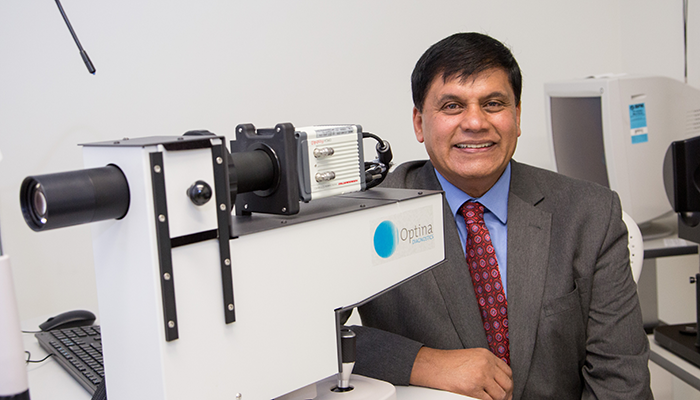Professor Ralph Martins AO, from Macquarie’s Department of Biomedical Sciences, has been awarded $3,115,063.90 by the Medical Research Future Fund under the International Clinical Trials Collaboration scheme. The aim of the trial is to investigate lifestyle interventions that may reduce the risk of Alzheimer’s disease.
Professor Martins and his team are highly regarded globally for developing non-invasive and cost-effective early diagnostics for pre-clinical Alzheimer’s disease, and his research has led to a number of pioneering discoveries such as the role of beta-amyloid and oxidative stress in causing this disease.
Alzheimer’s disease is characterised by loss of brain cells resulting in cognitive impairment and leading to dementia. Preliminary trials conducted in Europe have shown significant benefits in a multi-modal treatment comprising prescribed diet, exercise, cognitive stimulation and vascular risk monitoring, which improved cognitive functioning in at-risk older adults.
The AUstralian-multidomain Approach to Reduce dementia Risk by prOtecting brain health With lifestyle intervention (AU-ARROW) study is the Australian adaptation of a two-year international, randomised, single-blind clinical trial of this multi-modal treatment, and will be strongly aligned with the US-POINTER study.
Macquarie University's MQ Health Clinics and Edith Cowan University’s Sarich Neuroscience Research Institute will host the trial involving 600 participants at risk of cognitive decline and dementia.
By measuring brain health through cognitive and clinical assessments, brain imaging and blood biomarkers, the researchers will be able to track cognitive changes as a result of the treatment.
Professor Martins says: “The results of this study could have large-scale implications for clinical care, treatment and prevention of Alzheimer’s disease. Preventative measures to protect brain health are becoming increasingly important with our ageing population and the fast-growing number of older Australians at risk of dementia.
“Our ongoing preventive clinical trials include the Testosterone and DHA (Omega 3) on Amyloid Load in brain (ToTAL) study and the Coconut Oil in Alzheimer’s disease – Prevention (COAD-P) study. Early diagnosis projects include identifying novel blood biomarkers and a clinical trial on imaging the eye using a state-of-the-art, NASA-inspired technology in the form of a hyperspectral retinal imaging camera.”
Macquarie University Deputy Vice-Chancellor Research, Professor Sakkie Pretorius says the funding will support Macquarie’s ongoing contribution to advancements in Alzheimer’s disease research.
“Macquarie University researchers are at the forefront of understanding the mechanisms and developing novel therapies for Alzheimer’s Disease, Australia’s second leading cause of death. The AU-ARROW project promises to significantly impact global approaches to address this pressing health concern.”

Professor Ralph Martins AO from the Department of Biomedical Sciences.



